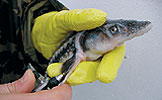
Romania bans sturgeon fishing for ten years
 The methods used for artificial propagation will be strictly controlled under the ban. Young sturgeons for restocking will be tagged before being released in the river.
The methods used for artificial propagation will be strictly controlled under the ban. Young sturgeons for restocking will be tagged before being released in the river.
The Romanian government has issued a ban on the commercial fishing of all wild sturgeon species (including ship, Danube, stellate, sterlet and beluga sturgeon) for a ten-year period. The order also bans the trading of products or sub-products obtained from sturgeon captured in Romania, and requires any sturgeon captured accidentally to be released, regardless of its condition.
The ban was ordered in response to concerns over the continuing decline of sturgeon populations and the extinction of other sturgeon species in Europe over the last century.
“We were beginning to see a trend in beluga sturgeon numbers that we’d seen a few years ago with the Danube sturgeon,” says Radu Suciu, Head of the Sturgeon Research Group at the Danube Delta National Institute. “If fish are well managed, the majority of the population should be young fi rst-time spawners,” explains Suciu. “Instead, the beluga sturgeons being caught in 2005 were between 25 and 30 years old — old fish, and there simply weren’t young fish born after 1990 surviving to maturity.”
The ban in Romania is a good start, but the Sturgeon Research Group will bring the data to the next meeting of the North-western Black Sea and Lower Danube Sturgeon Management Group, to ask fellow members Bulgaria, Serbia and Montenegro, and Ukraine to enact bans of their own. “We expect that once other countries see the data, they will adopt similar conservation measures,” says Suciu.
Disclaimer
The information contained in the ICPDR website is intended to enhance public access to information about the ICPDR and the Danube River. The information is correct to the best of the knowledge of the ICPDR Secretariat. If errors are brought to our attention we will try to correct them.
The ICPDR, expert group members, nor other parties involved in preparation of information contained on this website cannot, however, be held responsible for the correctness and validity of the data and information provided, nor accept responsibility or liability for damages or losses arising directly or indirectly from the use of the information conveyed therein.
Only those documents clearly marked ICPDR documents reflect the position of the ICPDR.
Any links to other websites are provided for your convenience only. The ICPDR does not accept any responsibility for the accuracy, availability, or appropriateness to the user's purposes, of any information or services on any other website.
When using the information and material provided on this website, credit should be given to the ICPDR.
